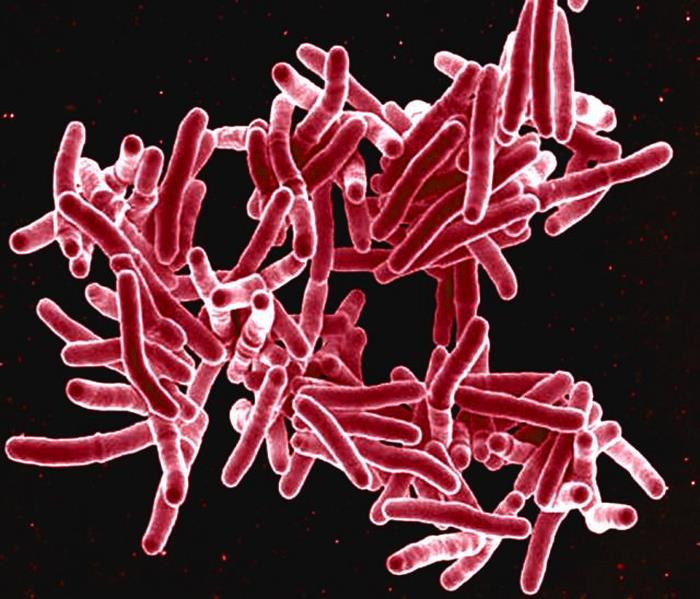PETA: Ringling Bros. and Barnum & Bailey Circus took TB infected elephants on the road
Ringling Bros response: Ringling Bros. respond to PETA TB allegations, calls them 'patently false'
It was announced this week that the "Greatest Show on Earth" will stop elephant performances by 2018. The Feld Family, owners of Feld Entertainment, Inc., the parent company of Ringling Bros. and Barnum & Bailey, announced plans today to remove Asian elephants from their traveling circus performances over growing public concern about the animals.
Under the plan, 13 elephants currently traveling with the three Ringling Bros. circus units will be relocated to the Ringling Bros. Center for Elephant for Conservation(R) in Florida by 2018. There they will join the rest of the Ringling Bros. herd of more than 40 elephants.

Mycobacterium tuberculosis bacteria/CDC
This clearly a victory for animal rights activists like the People for the Ethical Treatment of Animals (PETA) despite them saying it should happen immediately.
PETA has claimed for decades that the Ringling Bros. and Barnum & Bailey Circus abused the elephants. In an open-records request and obtained documents that prove, at least since 2010, Ringling has had elephants test positive for the human strain of tuberculosis (TB). TB can be deadly and is highly transmissible from elephants to humans, even without direct contact.
"Ringling's announcement seems to have been a pre-emptive move to keep the public in the dark about the extent of the health risk posed by moving sick elephants to cities throughout the country," says PETA Foundation Deputy General Counsel Delcianna Winders. "It's clear that Ringling must not wait until 2018 to take the elephants out of its shows-these elephants suffer greatly, but now their retirement is vital to everyone's safety."
Concerning TB in the elephants, PETA said in a report released Friday:
The documents, which Ringling and the U.S. Department of Agriculture refused to release to PETA for years, reveal that in 2010, at least 11 elephants with the circus tested positive for tuberculosis. Two elephants were on the road with active TB for approximately two months each. Elephants used by Ringling have had TB since at least 1978, and roughly one-third of the elephants used by Ringling have tested positive for the disease. Although several Ringling employees have been treated for TB-and TB carried by an elephant was linked to an outbreak among eight humans at an elephant sanctuary, some of whom had no direct contact with the elephant-Ringling has consistently opposed efforts by officials to improve testing requirements for TB in elephants.
Tuberculosis (TB) is caused by bacteria in the genus Mycobacterium. There are over 100 species of mycobacteria but the two that are of greatest concern for elephants (and humans) are M. tuberculosis and M. bovis, according to the website, Elephantcare.org.
TB is spread through the air on infected droplets that are aerosolized when an infected person or animal sneezes, coughs, or in the case of an elephant, sprays. Captive elephants can get TB by inhaling infected droplets from infected humans, cattle, or other infected elephants. Elephant to elephant transmission may occur when one elephant places it trunk inside another elephant's mouth which is a common practice for elephants. TB organisms have also been isolated from elephant feces and other body secretions. To date TB has not been reported in wild elephants.
According to the US Department of Agriculture's "2012 Guidelines for the Control of Tuberculosis in Elephants", the following tests are required as part of the annual testing requirement for TB in elephants-The Stat-Pak (screen) and MAPIA (confirmatory).
Both are serological tests for detection of antibodies.
The trunk wash is used to detect the actual TB organism and must be cultured. The USDA says the trunk wash is considered the definitive test for TB in elephants as it is a direct test. A positive culture is the most reliable test to show that an elephant has TB.
Feld Entertainment, Inc. has not responded on their website to the PETA report. A request for a statement has been sent.
UPDATE
3-9-15 2:10 pm ET
In response to the statement from Feld Entertainment, Inc. earlier today, David Perle, Senior Media Coordinator for PETA sent the following email to Outbreak News Today from PETA Foundation's Deputy General Counsel, Delcianna Winders:
PETA's report is based, in large part, not on STAT-PAK tests, as Ringling claims, but on trunk wash cultures, which Ringling itself touts as the "gold standard." The following is from PETA's report,which includes links to Ringling's own trunk wash tests:
Documents just received by PETA reveal that a sample collected from the elephant Banko on April 17, 2014, while she was performing with Ringling in Fairfax, Virginia, and cultured was tested for tuberculosis. More than two months later, on June 25, 2014, following performances in front of audiences across the United States, the test results came back-Banko had active TB and had been exposing the other elephants, the circus staff, the arena workers, and countless members of the public to the disease. Despite the transmission risk, none of the elephants performing alongside Banko was removed for quarantine. Banko herself had similarly been exposed to TB the previous year, when the elephant Asia tested positive for TB while on the road.
Let there be no mistake about it: Despite Ringling's outright lies, its own records show that just since 2013, at least two traveling elephants produced positive trunk washes, and both of these elephants were on the road for many weeks with active tuberculosis. During that time, other elephants, arena workers, and the public were unquestionably put at risk.